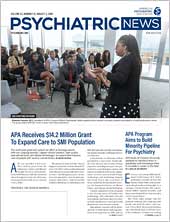There are no FDA-approved medications to manage the behavioral and psychological symptoms of dementia (BPSD), which include anxiety, apathy, depression, delusions/hallucinations, and more. Left untreated such symptoms can pose great risks to the patient and increase caregiver burden.
A treatment algorithm developed by Rajesh R. Tampi, M.D., chief of geriatric psychiatry and director of the residency program at Case Western Reserve University’s MetroHealth Program, helps clinicians manage BPSD and limit side effects, he explained at APA’s 2018 Annual Meeting. The algorithm is based on meta-analyses, research reviews, and studies conducted by Tampi’s team.
MetroHealth clinicians use a model of patient-centric care and involve families early in treatment plan discussions.
“Recognition [of BPSD] is the first and most important step. Many times, patients and their families don’t realize their loved one has dementia,” Tampi said. Clinicians begin by obtaining a complete history; performing a thorough physical examination, including urinalysis and bloodwork; and checking vitamin B12 and folate levels. Next, the severity of the patient’s dementia is quantified with formal assessments, including the Montreal Cognitive Assessment (MoCA), Pittsburgh Agitation Scale, and Functional Assessment Screening Tool (FAST), which are free and quick to administer, explained Juan J. Young, M.D., a co-chief resident in psychiatry at Case Western Reserve University MetroHealth.
Understanding the etiology of BPSD is important because the treatments differ depending on whether a symptom is caused by exacerbation of a preexisting neuropsychiatric disorder or by progression of dementia, Tampi said. Medical issues, particularly pneumonia, pain, constipation, and urinary tract infections (UTI), can also be the cause of the problem. He asks all patients if they are taking any new medications or if they have any new physical symptoms, including pain, frequent urination, or burning when urinating.
In several meta-analyses and systematic reviews, nonpharmacological interventions for BPSD, such as psychoeducation, caregiver training, and cognitive stimulation therapy, have been found as effective as pharmacological interventions, so clinicians at MetroHealth try these first, Tampi said. One exception to this approach is if the patient is experiencing “emergent behaviors,” such as aggression, violence, or extreme paranoia, which warrants immediate pharmacological intervention.
Tampi’s other recommendations include the following:
•
Cognitive enhancers: For mild to moderate dementia, the algorithm calls for starting the patient on acetylcholinesterase inhibitors (AChEIs) and for moderately severe to severe dementia, AChEIs plus memantine. These are well tolerated by patients and can slow cognitive decline and the onset of new symptoms, Tampi said. However, for patients already experiencing severe dementia and a poor quality of life, he recommends having a discussion around ethics with the families first.
•
SSRIs: Although psychosis caused by dementia appears similar to schizophrenia, its etiology is very different. Because of this, antidepressants have the most evidence of efficacy for BPSD. Tampi said he typically tries escitalopram, mirtazapine, or sertraline first.
•
Benzodiazepines: Tampi cautions that benzodiazepines should be avoided with geriatric patients because they worsen cognition and can overly sedate patients, increasing the risk of falls.
•
Atypical antipsychotics: Research reviews have found atypical antipsychotics give only a modest advantage when compared with placebo in patients with BPSD, but have significant side effects, including worsening cognition. When such medications are needed—for treatment-resistant aggression, delirium, and hallucinations—low doses of aripiprazole, olanzapine, quetiapine, or risperidone can be tried, Tampi said. Haloperidol is best for patients with delirium, he added.
When prescribing medication to patients with BPSD, Tampi said it is important to “start low (dose) and go slow, and don’t keep on going,” he said.
After a geriatric patient’s symptoms have been stable for four to six months, Tampi advises trying to taper them off the new medication, whenever possible. He reassesses for toxicity regularly, every eight to 12 weeks, and cautions against the use of polypharmacy, unless the patient fails to respond to all monotherapies.
“If you’re waiting for all the behaviors to subside before discharging a patient, it’s never going to happen,” Tampi said. He encourages caregivers to call him if a concern arises once a patient has been discharged so he can give advice on other suggestions to try. “This simple education technique can reduce the length of stay and reduce the readmission rates,” he said. ■

